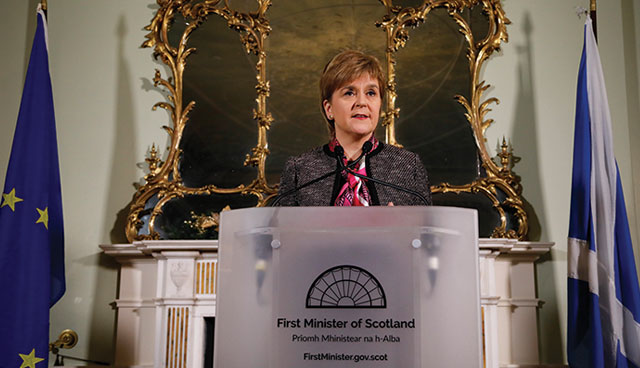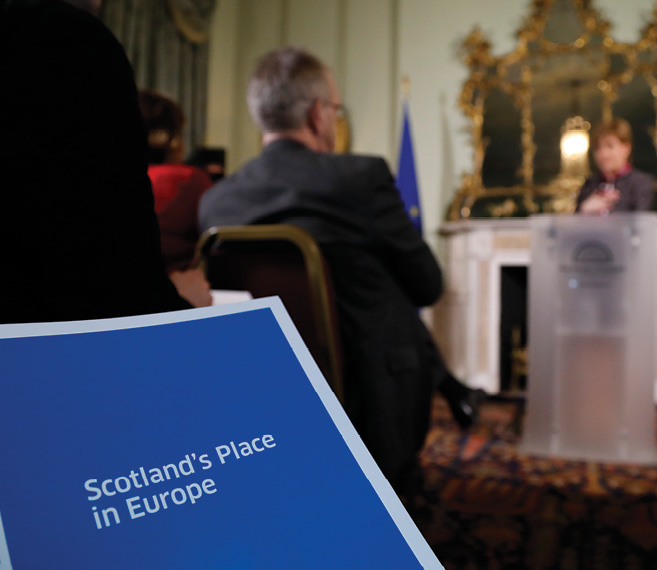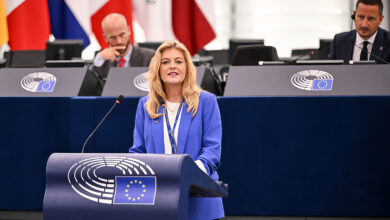Brexit: an alternative


Following the announcement of an inevitable ‘hard’ Brexit, eolas analyses Scotland’s 49-page proposal to protect Scotland’s place in the single market from within the UK.
Independence is Scotland’s “best option” for staying in the single market maintains Scottish First Minister Nicola Sturgeon, but calls for a fresh referendum following the Brexit result have been cooled through the Scotland’s Place in Europe paper.
“Compromise” and “common ground” are used in the context of finding a way forward for Scotland, which Sturgeon asserts would severely damage economic, social and cultural interests and proposals within the paper aim to mitigate these risks.
However, Scotland’s Place in Europe was released prior to Theresa May’s announcement that the UK “cannot possibly” remain within the European single market, as staying in it would mean “not leaving the EU at all”. This statement all but lays waste to the paper’s suggestion that the “least worst” outcome of any Brexit negotiations, for the UK as a whole, would be to maintain full membership of the single market through the European Economic Area (EEA) and to remain in the customs union.
Writing in the report’s forward, Sturgeon said: “It stands to reason that the proposals we put forward in this paper fall short of what we consider to be the best status for Scotland and the UK – full membership of the EU. However, they are designed to mitigate – as far as possible – the real and serious risks for Scotland caused by being taken out of the EU against our will.”

It is estimated that a hard Brexit has the potential to remove £11 billion from the Scottish economy and short of the UK remaining in the single market, which is now unlikely, then the UK Government should offer its support to Scotland retaining access, according to the paper.
It also suggests a shift in powers and devolution arrangements. As well as seeking to retain powers that allow for pan-European links in areas of devolved competence such as Europol and Erasmus, the paper also calls for the safeguarding, as well as expansion, of Scottish Parliament powers. The main focus is on those powers currently held in Brussels and ensuring they are repatriated to Parliament, rather than a “greater concentration” at Westminster, in areas such as safety laws, employment and health. However, there is also a wish for “consideration of significant new powers” to protect Scotland’s interests in the relation to European relationships, while powers already controlled by Parliament, in areas such as agriculture and fisheries, must remain fully devolved.
Theresa May’s outlining of tariff-free trade with the EU and establishment of a customs agreement with the EU as a priority is unlikely to appease Scotland’s desire to remain in the customs union and avoid potential export tariffs. It’s estimated that over 300,000 jobs across Scotland are supported by the export sector and this area would be highly damaged by any removal from the single market and customs union.
Other areas which the report highlights are likely to be detrimentally affected include:
- superfast broadband, business development and housing investment;
- 1,000 EU-owned companies in Scotland, of which “a number of companies are re-evaluating their investments in the UK”;
- the financial services sector and Scotland’s research and innovation activities; and
- public services, for example health, where 3 per cent of staff are from other EU countries.
The report also states that there are “real concerns” surrounding worker rights protections outlined by the EU to form national policy. While Scotland requires a role in areas such as climate change and energy policy; law enforcement; criminal law and access to EU funding for universities.
Norway option
Suggesting ways in which Scotland could continue to hold membership of the single market, collaboration on key aspects of policy and participation in EU programmes, the reports states: “Nothing in this proposal prioritises the European single market over free movement and free trade within the UK nor places free movement and free trade on any different footing from presently undertaken. Our proposal would secure for Scotland the benefits of the European single market in addition to – not instead of – free trade across the UK.
The key benefits of a similar arrangement to that of Norway and the EU’s include: access to the single market; retaining the right to travel, live, work and study in other EU and EEA countries; retaining and attracting indigenous and inward investment to part of the UK.
The report also highlights some of the potential challenges facing proposals and suggests alternatives to some of the main barriers. These include technical issues such as the free trade and movement within the UK as a member of the single market, legal issues around Scotland’s sovereignty and financial arrangements requiring member states to contribute to the EU.
Recognising the likely challenges the proposal presents, Sturgeon adds: “We fully acknowledge the option set out in this paper is challenging. But these challenges must be seen in a context where the Brexit vote and the UK Government’s apparent drive for a “hard Brexit” mean that there are no simple options.
“We believe our practical solutions are reasonable and in the best interests of Scotland – in a context that will be complex and unprecedented whatever the ultimate outcome.”
Although Downing Street welcomed the publication for consideration, firm moves towards a hard Brexit announced by May in mid-January led to Sturgeon declaring that a second independence referendum was now “more likely”.





